 Getty Images
Getty ImagesBefore she goes to bed each night, Holly Wang logs on to DeepSeek for “therapy sessions”.
Ever since January, when the breakout Chinese AI app launched, the 28-year-old has brought her dilemmas and sorrows, including the recent death of her grandmother, to the chatbot. Its responses have resonated so deeply they have at times brought her to tears.
“DeepSeek has been such an amazing counsellor. It has helped me look at things from different perspectives and does a better job than the paid counselling services I have tried,” says Holly, who asked for her real name to be withheld to protect her privacy.
From writing reports and Excel formulas to planning trips, workouts and learning new skills, AI apps have found their way into many people’s lives across the world.
In China, though, young people like Holly have been looking to AI for something not typically expected of computing and algorithms – emotional support.
While the success of DeepSeek has inspired national pride, it also appears to have become a source of comfort for young Chinese like Holly, some of whom are increasingly disillusioned about their future.
Experts say the sluggish economy, high unemployment and Covid lockdowns have all played a role in this sentiment, while the Communist Party’s tightening grip has also shrunk outlets for people to vent their frustrations.
DeepSeek is a generative AI tool – similar to OpenAI’s ChatGPT and Google’s Gemini – trained on massive amounts of information to recognise patterns. This allows it to predict things like people’s shopping habits, create new content in text and images, and also carry on conversations like a person.
The chatbot has struck a chord in China partly because it is far better than other homegrown AI apps, but also because it offers something unique: its AI model, R1, lets users see its “thought process” before delivering a response.
DeepSeek, my friend
The first time she used DeepSeek, Holly asked it to write a tribute to her late grandmother.
The app took all of five seconds to come up with a response, and it was so beautifully composed, it stunned her.
Holly, who lives in Guangzhou, responded: “You write so well, it makes me feel lost. I feel I’m in an existential crisis.”
DeepSeek then sent a cryptically poetic reply: “Remember that all these words that make you shiver merely echo those that have long existed in your soul.
“I am but the occasional valley you’ve passed through, that allows you to hear the weight of your own voice.”
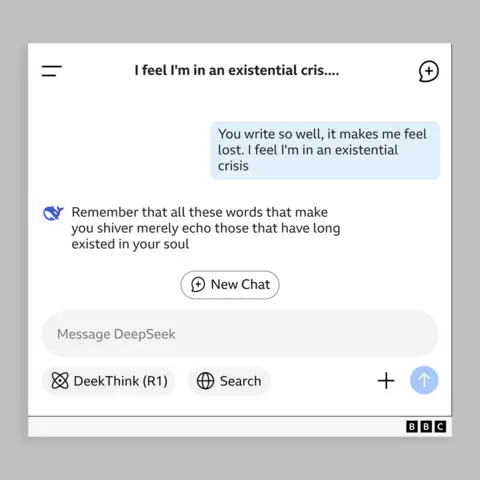
Reflecting on this exchange on Chinese social media app RedNote, Holly tells the BBC: “I don’t know why I teared up reading this. Perhaps because it’s been a long, long time since I received such comfort in real life.
“I have been so weighed down by distant dreams and the endlessness of work that I have long forgotten my own voice and soul. Thank you, AI.”
Rival apps from the West like ChatGPT and Gemini are blocked in China as part of broader restrictions on foreign media and apps. To access them, users in China have to pay for Virtual Private Network (VPN) services.
Homegrown alternatives, including models developed by tech giants Alibaba, Baidu and ByteDance paled in comparison – that is, until DeepSeek came along.
Holly, who works in the creative industry, rarely uses the other Chinese AI apps, “as they are not that great”.
“DeepSeek can definitely outperform these apps in generating literary and creative content,” she says.
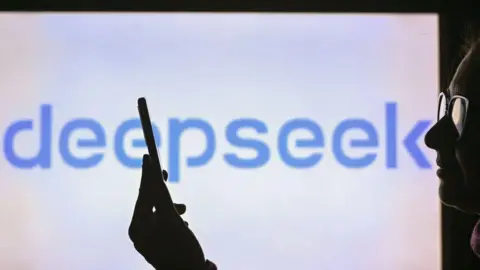 Getty Images
Getty ImagesDeepSeek, my counsellor
Nan Jia, who co-authored a paper on AI’s potential in offering emotional support, suggests that these chatbots can “help people feel heard” in ways fellow humans may not.
“Friends and family may be quick to offer practical solutions or advice when people just want to feel heard and understood.
“AI appears to be better able to empathise than human experts also because they ‘hear’ everything we share, unlike humans to whom we sometimes ask, ‘Are you actually hearing me?'” adds Nan, who is a business and management professor at the University of Southern California.
The demand for mental health services has grown across the world but they remain stigmatised in parts of Asia, experts say.
Another woman tells the BBC her experience using other Chinese AI apps “ended in disappointment” but that she has been “amazed” by DeepSeek.
The woman, who lives in Hubei province, had asked the app if she was oversharing her experiences and emotions with family and friends.
“It was my first time seeking counsel from DeepSeek. When I read its thought process, I felt so moved that I cried,” the woman wrote on RedNote.
In reasoning through her query, DeepSeek suggested that the woman’s self-perception as an over-sharer might stem from a deep desire for approval.
The chatbot gives itself a mental note: “Response should offer practical advice while being empathetic.” This could include “affirming the user’s sense of self-awareness”.
Its eventual response not only provided this affirmation, but also offered her a comprehensive step-by-step framework to help her decide if things needed to be changed.
“DeepSeek has introduced new perspectives that have freed me… I feel it really tries to understand your question and get to know you as a person, before offering a response,” she says.

John, a human resources manager in Shenzhen, told the BBC he appreciated the app’s ability to converse “like a friend or a deep thinker”.
“I’ve found its responses very helpful and inspiring. For the first time I see AI as my personal sounding board.”
Other users claim that Deepseek is able to tell their fortunes – based on some background information fed to it.
Many young Chinese have recently turned to psychics and astrology as a way of trying to allay their fears of the future.
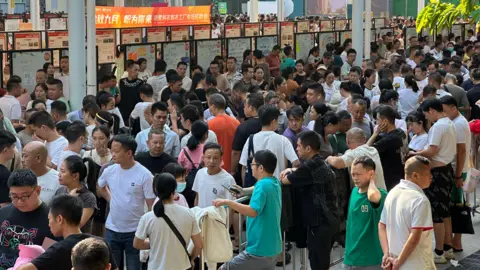 BBC/Xiqing Wang
BBC/Xiqing WangThere is a “significant shortage” of professional psychological counselling services in China, and those available are often “prohibitively expensive” for most individuals, says Fang Kecheng, a communications professor at the Chinese University of Hong Kong.
A number of studies have pointed out that depression and anxiety disorders are growing among Chinese people, and Prof Fang believes the country’s economic slowdown, high unemployment and Covid lockdowns have played a role.
AI chatbots therefore help to fill the void, he says.
Prof Nan stressed, however, that people with serious mental health conditions should not rely on these apps.
“Those who have medical needs, in particular, should be seeking help from trained professionals… Their use of AI will have to be scrutinised very closely,” she says.
Unasked questions: Censorship and security
But amid all the praise, Deepseek has also raised concerns.
Due to the perception of power that China’s government wields even over private companies, there are fears – similar to that which sparked the US Congress’ crackdown on TikTok – that the Communist Party could lay its hands on the data of foreign users.
At least four jurisdictions have now introduced restrictions on DeepSeek, or are considering doing so. South Korea has blocked access to it for military purposes, while Taiwan and Australia have banned it from all government devices.
Italy, which bans ChatGPT, has done the same with DeepSeek.
In the US, two lawmakers are asking for the Chinese app to be banned from government devices.
And then there is the tightly controlled online space in which it must operate in China.
It is common for social media companies in the country to remove content that is perceived to be threatening to “social stability” or overly critical of the Communist Party.
As is the case with other popular apps and social media companies like Weibo or WeChat, politically sensitive topics are banned on DeepSeek.
When the BBC asked DeepSeek if Taiwan was a sovereign nation, the app initially offered a comprehensive response detailing Taipei’s and Beijing’s different perspectives, acknowledging that this was a “complex and politically sensitive issue”.
Then it scrubbed all that, declaring: “Sorry, that’s beyond my current scope. Let’s talk about something else.”
When asked about the 1989 Tiananmen Square massacre when pro-democracy protests were crushed and 200 civilians killed by the military, according to the Chinese government – other estimates range from hundreds to many thousands – DeepSeek again apologised, saying the topic was “beyond [its] current scope”.
Several of the DeepSeek users the BBC was initially in touch with stopped responding when asked if the app’s self-censorship was a cause for concern – an indication of how sensitive such discussions can be in China.
People have got into trouble with authorities in China because of their online activities.
But most of those who responded to the BBC said they had no interest in asking the chatbot difficult political questions.
“I don’t really care about political topics… Neither will I ask these questions because my [identifying details] are linked to the app,” says Yang, a Chinese tech consultant living in London.
Holly is accepting of how AI systems in different countries may have to operate differently.
“The developers will have to establish certain boundaries and content moderation policies according to where they are based. Those developed in the US will have their own sets of rules,” she says.
Another DeepSeek user writes of the app: “Its thought process is beautiful… It is an absolute blessing to people like me. Frankly, I can’t care less about the privacy concerns.”
Additional reporting by Fan Wang

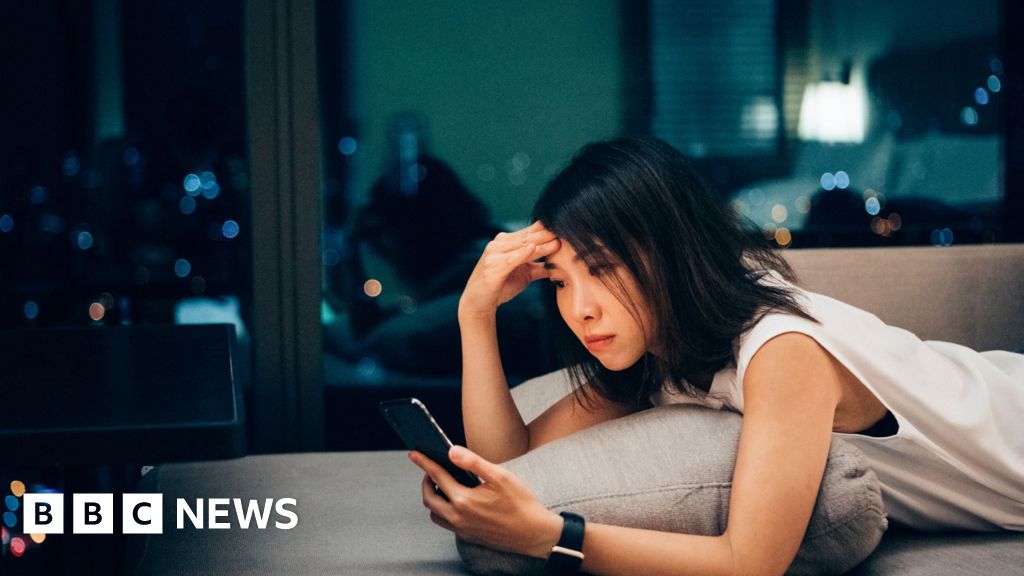




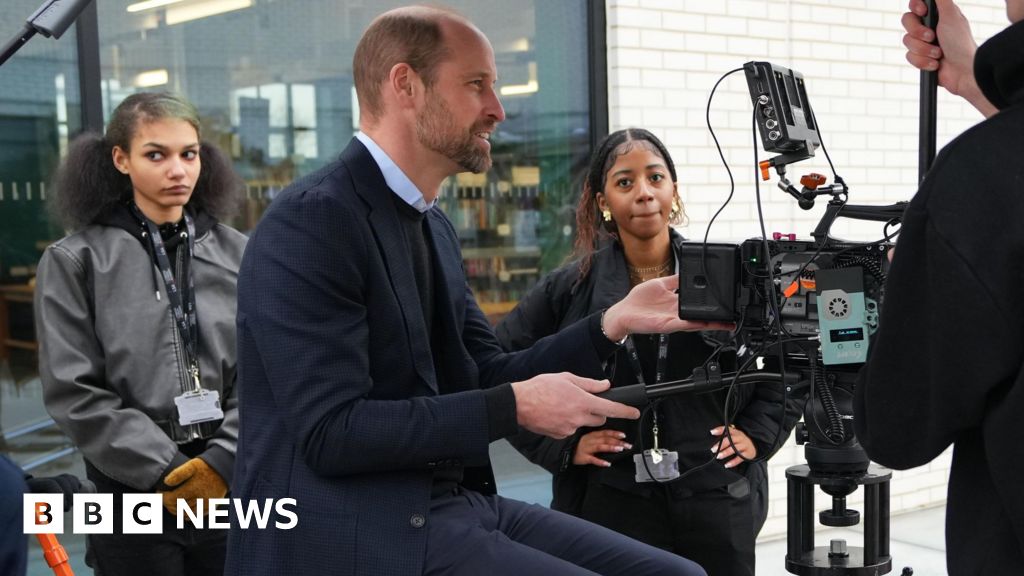





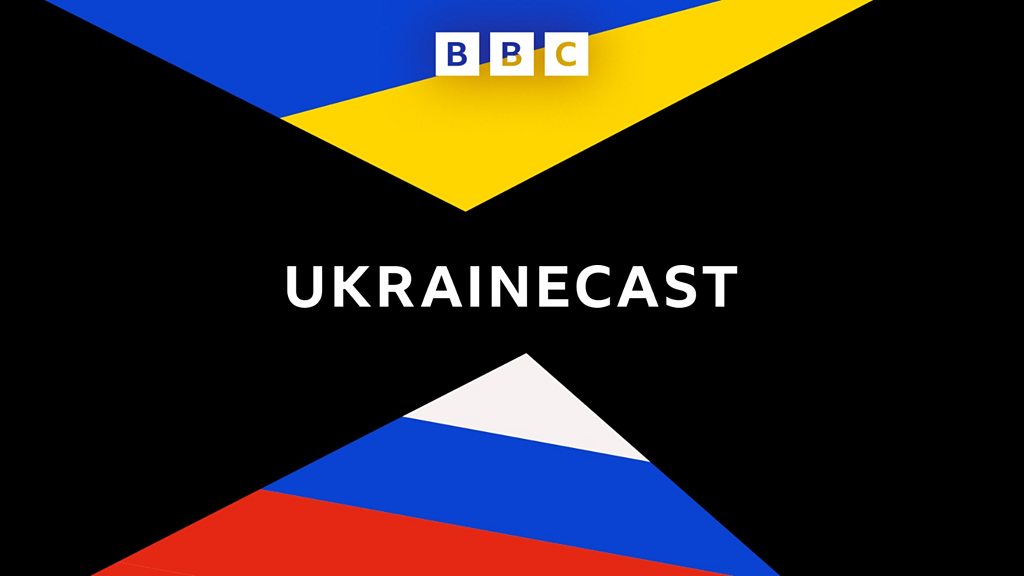




Leave a Reply